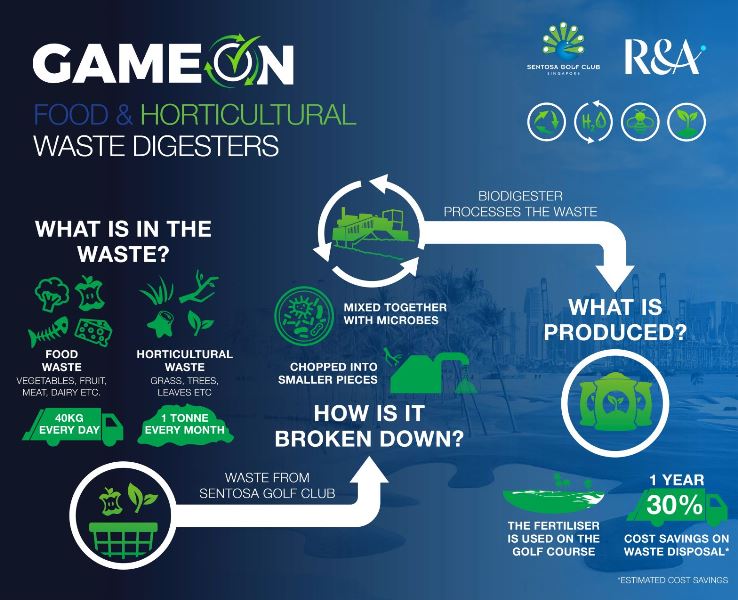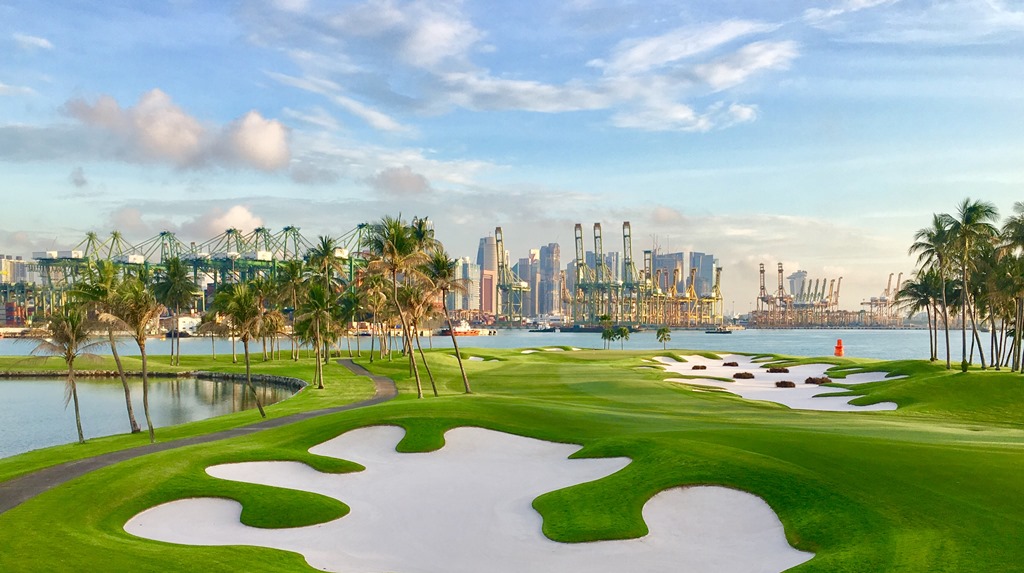Sentosa Golf Club in Singapore is set to install two digesters that will make it the first club in Asia with the ability to grind down food and horticultural waste to reuse as fertiliser on the golf course.
Using a Golf Sustainability Fund Grant awarded by The R&A, the award-winning club on Sentosa Island will reuse 40kg of food waste generated each day along with the one tonne of horticultural waste produced every month. The grant is part of a project that will also help bring sustainable organic waste management practices to golf courses in Asia.
The first stage of the process involves using a food waste bio-digester to process and grind down waste from the club’s three F&B outlets on site. Once microbes are added to the waste it is ready for use as organic fertiliser on the club’s two golf courses, The Serapong and The New Tanjong. The second stage introduces a heavy duty woodchipper and bio-digester shredder to grind an estimated one tonne of horticulture waste that is generated each month.
Sentosa Golf Club estimates cost savings of up to 30% on monthly waste disposal over a one-year period.
While the club does not currently purchase and apply compost material on the golf course, it foresees that a suitable compost by-product can be derived from this project and used on the golf course to aid moisture retention on the fairways, thereby reducing the need for irrigation.

Andrew Johnston, Sentosa Golf Club’s director of agronomy and general manager, said: “It is very humbling for Sentosa Golf Club to be chosen by The R&A to be part of its Golf Sustainability Fund. Personally, I’m very proud of what the club has achieved in recent years with its environmental efforts. The entire team at the club can be recognised for their hard work and dedication towards creating an environmentally sustainable environment – it has become a way of life at the club.
“This grant will help us go a long way towards further achieving our goals and the waste recycling project along with all the other initiatives we have implemented here at the club, will hopefully inspire other clubs around the world to play their part in becoming more sustainable.”
On the importance of such an initiative, Johnston added: “Most horticultural and golf course waste is currently disposed through the process of waste incineration or burial administered by the local authorities. This adds to air pollution and applies pressure to landfill sites, which is particularly pertinent to land-starved Singapore.”
Dominic Wall, director – Asia-Pacific at the R&A, noted: “Sentosa Golf Club has introduced many environmental-friendly golf course practices over the last few years and The R&A is excited to work with them on this project, not only to allow them to further a more sustainable environment at the club, but also to provide the vital research needed for other clubs in Asia and around the world to use as best practice.”
Chris Gray, head of sustainability and agronomy – Asia-Pacific at The R&A, added: “The R&A is extremely pleased to be able to work closely with Sentosa Golf Club through our sustainability fund and help them continue to raise the bar and act as a model for other golf clubs around the world to follow in terms of environmental sustainability.”
Sentosa Golf Club’s green agenda was initially brought to the attention of the golfing world with the launch of its #KeepItGreen campaign at the SMBC Singapore Open in January 2018, which saw a number of key environmental features implemented such as the creation of on-site bee colonies; the use of rechargeable lithium batteries in golf carts; banning single use plastics from the golf course; as well as the installation of electric vehicle charging sockets.
The club unveiled a new global campaign, GAME ON, at the start of the year, designed to unite the global golf community in addressing the growing concerns of climate change. It was also recently announced as the world’s first golf club to sign the UN’s Sports for Climate Action Initiative.
















